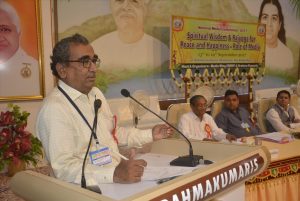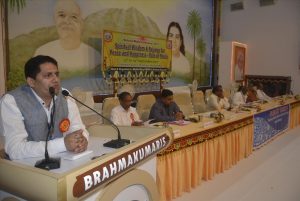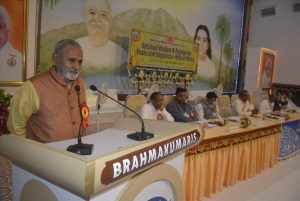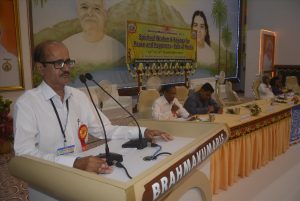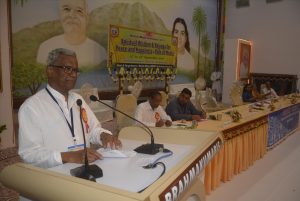Abu Road, September 17: The media wields enormous power to bring about change in Indian society, and it must set an agenda to eradicate social evils such as poverty and inequality, participants in a media conference were told here today.
Just three publications started by Raja Ram Mohan Roy enabled him to have the practice of sati abolished in the country nearly two centuries ago, so there was no reason why the 100,000-odd newspapers and around 1,000 television channels in India could not bring about social change, said Dr C V Narasimha Reddi, Editor of Public Relations Voice, Hyderabad.
Reddi was speaking during the plenary session of a media conference on ‘Spiritual Wisdom and Rajyoga for Peace and Happiness — Role of Media’, being held at the Shantivan campus of the Brahma Kumaris here. More than 1,500 delegates from various parts of the country representing the fields of media, advertising and public relations are taking part in the event.
Enumerating the problems afflicting Indian society, including lack of cleanliness and infant mortality, Reddi called on the government to formulate a plan to eliminate them with the help of the media and voluntary groups.
Media experts who spoke during the session, titled ‘Shaping Public Opinion and Social Change — Role of Media’, repeatedly underlined the fact that the media was a powerful tool for bringing about social change, but it would be effective only if it was guided by principles and not just the profit motive.
Prof. Sanjeev Bhanawat, head of the Centre for Mass Communications, Rajasthan University, said media outlets must introspect whether they were highlighting a news story to shape public opinion for a social cause or to boost their viewership ratings.
“The media can bring about a revolution in society, but not if it is guided by vested interests”, Bhanawat said.
In a scenario where the institution of the editor is in decline and news has become a product to be sold for profit, social media offers hope as it allows ordinary citizens to freely express their ideas, he added.
Noting how newspapers and television channels had turned Anna Hazare’s anti-corruption crusade into a people’s movement, Dr Rajeev Tyagi, Pro-Chancellor of Motherhood University, Roorkee, said the media was still playing a positive role. The average voting percentage in elections had increased 20 per cent in the past ten years because of public awareness created by the media about the importance of citizens exercising their franchise, he said.
The freedom of expression granted by the constitution was not just for media barons and editors, and the common man must use it to help serve society, he added.
S S Tripathi, National President, All India Small Newspapers Association, said the daily news reports of crime, corruption and violence pointed to a great need for social change, and the print media had a big role to play in bringing about that change. Media persons must first transform themselves by adopting the right values before they can transform the world, he said.
Ananya Mehta, a member of the faculty of Symbiosis Centre for Media and Communications, Pune, said the media was an impactful tool and it should be used to shape public opinion, which acts as a catalyst for social change.
Geetha Shankar, Director of Gulf PR Consultancy, Bengaluru, said that while the media had grown in terms of its reach and revenue, the ethical underpinnings of journalism had become weak. She asked if the media should continue with its strategy of relying on advertisements for revenue.
Noting that the media does help inform and educate the masses, she said it should empower youth to make them responsible citizens.
Madhukar Dwivedi, Editor of Chhattisgarh Bandhu, said the media today faced a crisis of credibility, and while journalists could amass wealth by acting as middlemen, they could serve society only if they acted as journalists.
If journalists kept looking for the bad in the good, the good would vanish after some time, he warned, and called for media persons to empower themselves spiritually in order to be of use to society.


